Bringing Cairo’s City of the Dead to Life at MASQ
They call it Cairo’s City of the Dead, but the name is misleading. Known locally al-Qarafa, the area in fact hosts a lively community that lives in and around some of the world’s most beautiful examples of Islamic, and particularly Mamluk, architecture. Several hundred-year-old mausolea, mosques, schools scatter this historically rich area, existing side-by-side with a very much living community. In the center of the neighborhood is the Maq‘ad of Sultan Qaitbey, more commonly known as MASQ, which since 2016 has set out to preserve much of this irreplaceable architectural heritage, but has also along the way started to redefine how best heritage conservation projects in living cities should be done. By collaborating with the community and repurposing historical buildings as community centers to provide workshops, language classes, sports activities, art exhibitions, and concerts, MASQ has been able to benefit both the community and monuments.
Among the many activities and events that MASQ put on is their Sultan Fair, an evening of art, music, and entertainment for the local community and visitors alike, completely free of charge. The Sultan Fair also has a free walking tour through this incredible part of Cairo and a craft market highlighting the work done by local craftspeople. As autumn begins to creep in, MASQ is again hosting its Autumn Sultan Fair on Saturday, Oct.15. Alongside the craft market with locally made products from the likes of Mishka, is an art exhibition by Eiad Oraby called The Butterfly Effect followed in the evening by a concert from the talented Egyptian pianist and singer Ahmed ‘Ali El Haggar. Additionally, for those who haven’t been to the area before, or want to learn more about the area, there is a free walking tour of the City of the Dead earlier in the day as well, not to be missed.
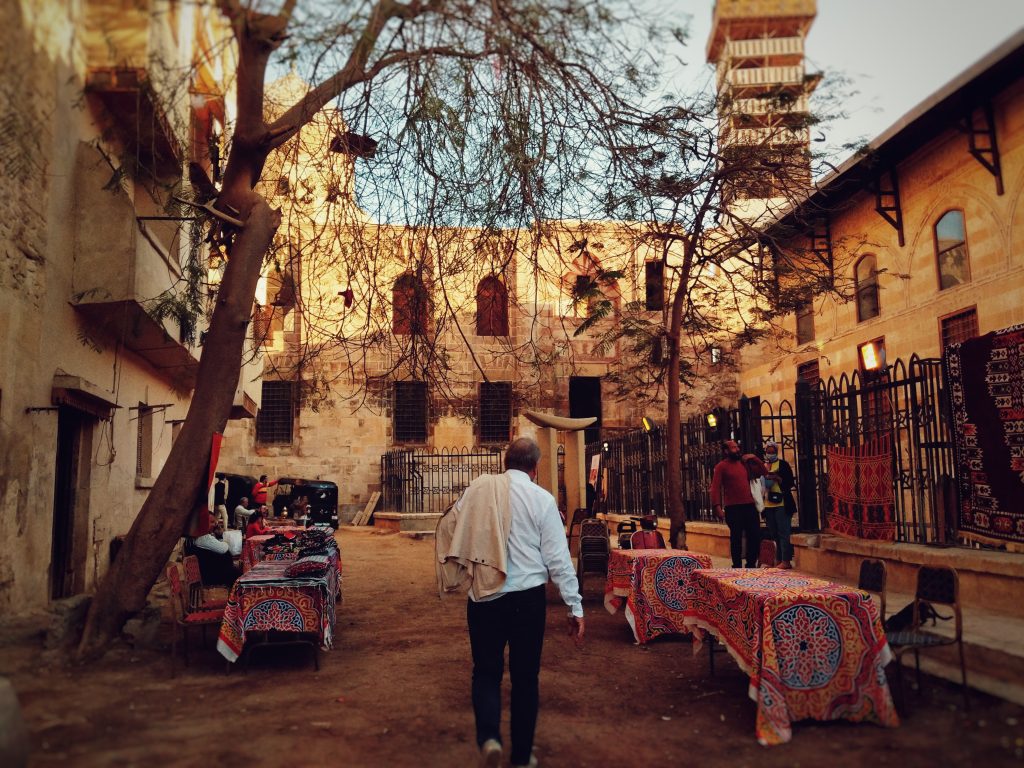
In the run-up to the Autumn Sultan’s Fair, we sat down with Agnieszka Dobrowolska, the founder of ARCHiNOS, who has been behind MASQ’s efforts to preserve the area’s rich architectural heritage and collaborate with the local community from the very start to find out more about the fascinating neighborhood and the work of MASQ.
The Maqa’d of Sultan Qaitbay is in what some people call the City of the Dead. Is it a dead city? Or is the term misleading?
It is a cemetery, it is a necropolis, it has been a cemetery since the thirteenth century, but it was never meant to be a cemetery in the Western sense of the term. Yes, there are burials and yes, it is still functioning today, but since the very beginning, people are meant to also live here. The complexes of the sultans and other figures have mausolea, where the burials are, but also mosques, schools known as madrassas, charitable foundations known as sabil kuttabs, residential buildings for rent, and a variety of buildings like toilets, markets, and everything else you can imagine.
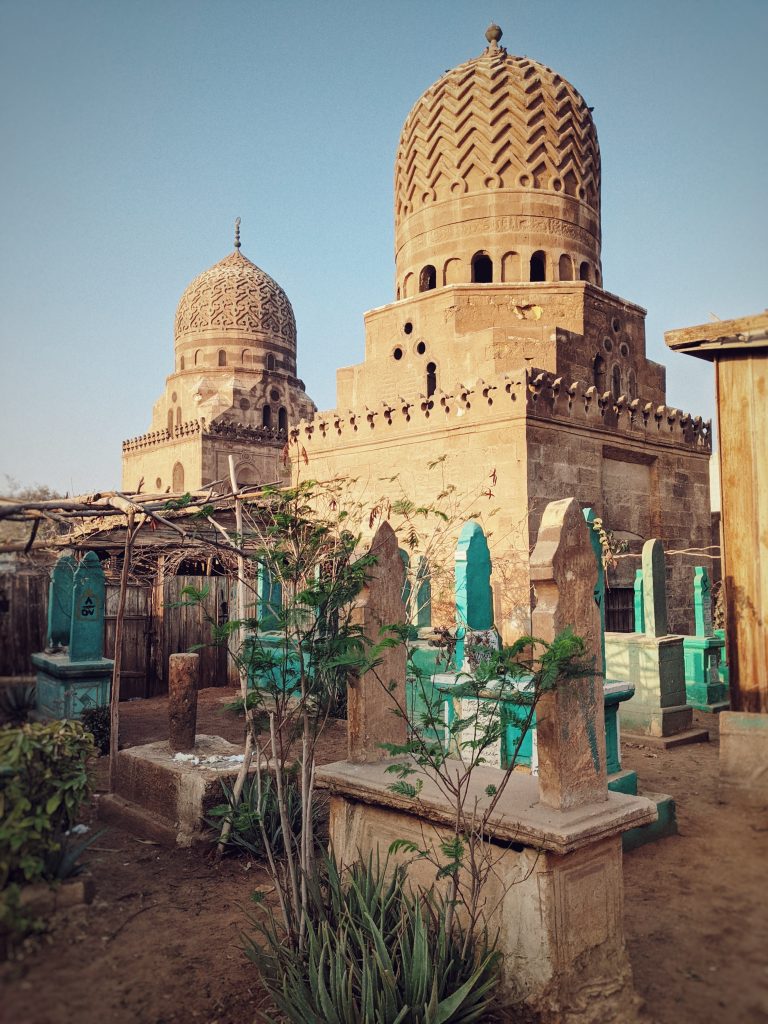
It is a city of the dead, but it was never meant for the dead only. In the 20th century, the population here grew considerably because there was pressure from rural migration from the countryside. They started of as bawabs, or guards to the mausolea, and then they brought their families and would live among the funerary enclosure, but later on, they built their own houses with electricity, water, and sewage. So it is a living city, but semi-formal, underprivileged, and stigmatized.
What do you personally find so special and important about this neighborhood?
Firstly, it is part of the World Heritage List by UNESCO, so it’s unique in that sense because it’s scattered with world-class monuments, especially in the Qaitbay Complex. It also has a very special character about it and feel because it’s also a cemetery. It’s much quieter and calmer than historic Cairo and especially places like Al-Moez Street. It has a special air, a special light, and the community is great and interesting.
Can you tell me a little about the Maqa’d of Sultan Qaitbay and its original history?
The name literally means ‘seat’ as in the ‘reception hall’ of the palatial complex that Sultan Qaitbay made for himself in 1474. He was an industrious sultan and ruled over a vast empire of Egypt and Syria, the Arab Peninsula, Jordan, and Palestine. He was also a peaceful ruler, so he became known as a great patron of architecture. He’s also known for the style of buildings built in Cairo during his rule, and in the Middle East, he is also known for buildings built by him in Damascus and Jerusalem.
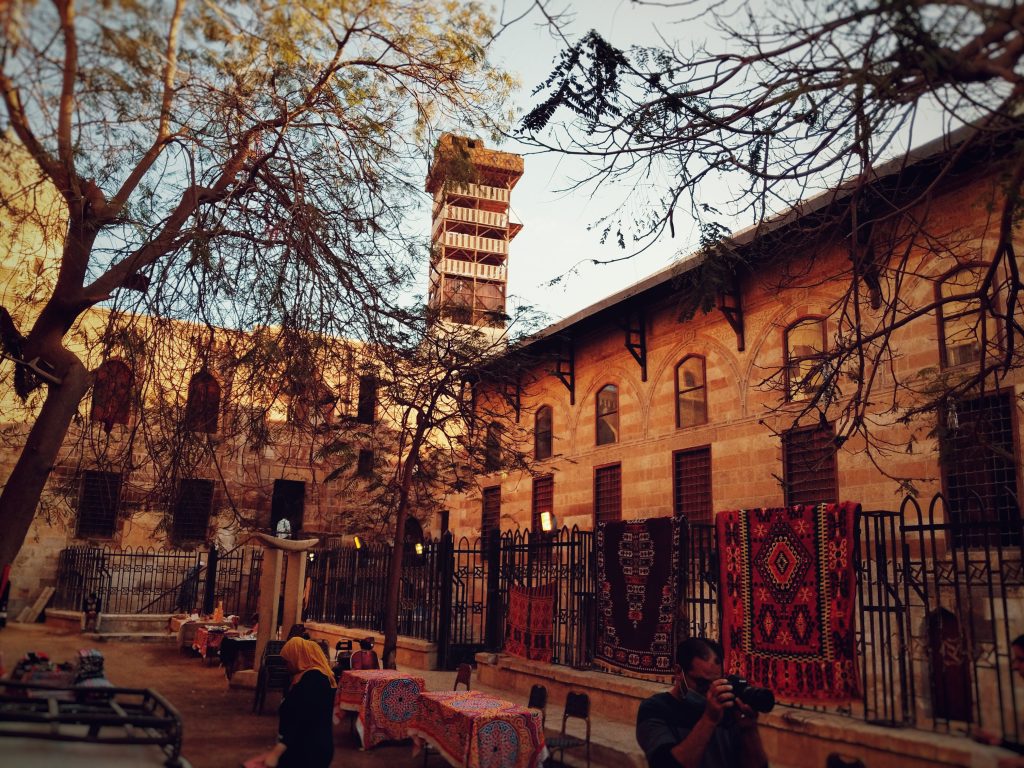
His seat was in the citadel, but he built this complex. He originally built a small tomb for himself just around the corner, but this was before he was the sultan and was just an amir. So, after he became sultan, he built himself a bigger and better burial place, which is now the Mosque and Madrassa of Sultan Qaitbay, which is an iconic example of Mamluk architecture that is even featured on the one-pound note.
Eventually, he was buried here, but according to the customs of the time, he and his entourage would descend from the citadel to stay here, meditate, and pray together for a number of days. He had a palatial complex of rooms that we have excavated and this was his reception hall to receive the guests. So, even the function of this building is proof that it was never meant for the dead.
The custom of visiting graves is alive today. Every Thursday, people come to visit their families and it isn’t like in the West where you light a candle and leave a bunch of flowers. Here, they drink tea and spend time with their dead. I think that maybe this comes from a pharaonic and Roman tradition; for instance, in Roman times on the Mediterranean coast, there was a city where they would have banquets with their dead. They would take the mummies out and everyone would eat and sit together.
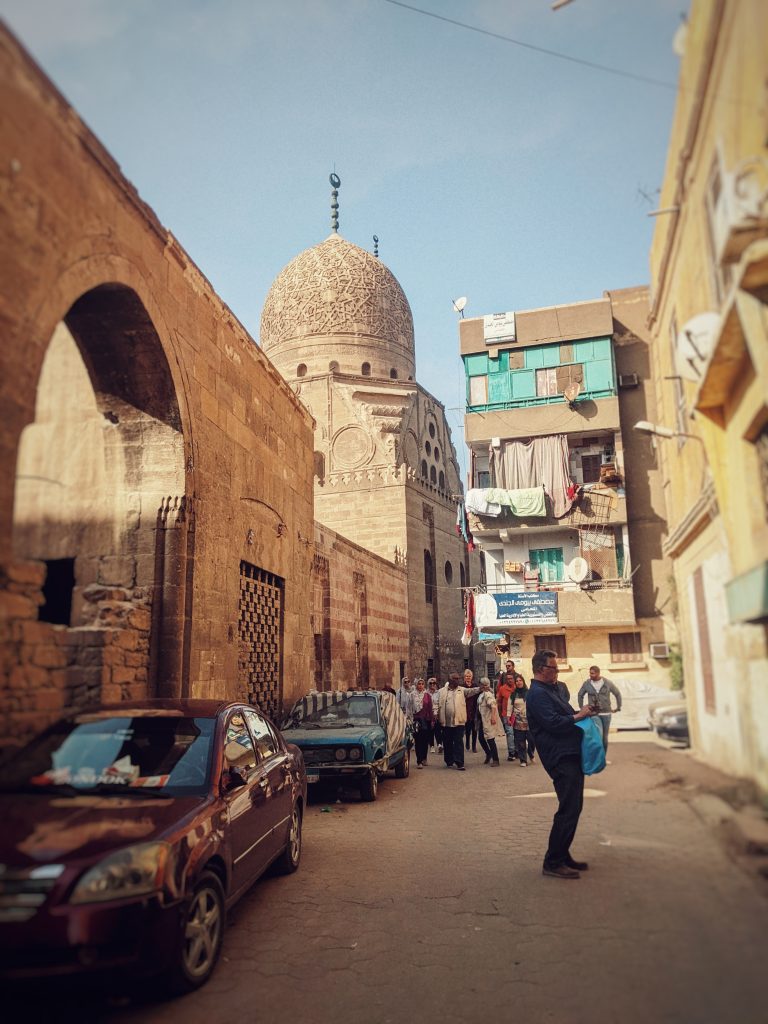
What has MASQ tried to do with this incredible space?
MASQ is the abbreviation of Maqa’d of Sultan Qaitbay, as simple as that. What we are running here is a major project that is multidisciplinary and multifaceted, and primarily sponsored by the European Union, but also with substantial additional funding from the Drosos Foundation. We’re involved in the project as Archinos Architecture and we have a non-profit sister organization called the Sultan Foundation, so these are two faces or hearts you could say.
At Archinos, we started off with conservation, but after being here in Cairo for a long time and through my career, I just realized that you cannot really successfully preserve monuments in isolation from the community that surrounds them. This is the community that lives and works literally in the shadow of the monuments. But luckily the Ministry of Antiquities also realized this and in 2015 they shifted their policy from not allowing us to do anything with the community to realize that adaptive reuse is actually beneficial for the monuments.
If you have an organization working here, they clean it and replace light bulbs, etcetera, because it’s being used. Additionally, for the community, if they only get a shell of a medieval building from the outside that is sitting empty, they don’t associate themselves with this building. So once we opened up for the local community with activities and workshops for women, and children, and everyone, they started realizing that this is part of their neighborhood, their heritage, and they started to associate themselves with the place. It’s beneficial for both sides because the monument benefits and the community benefit.
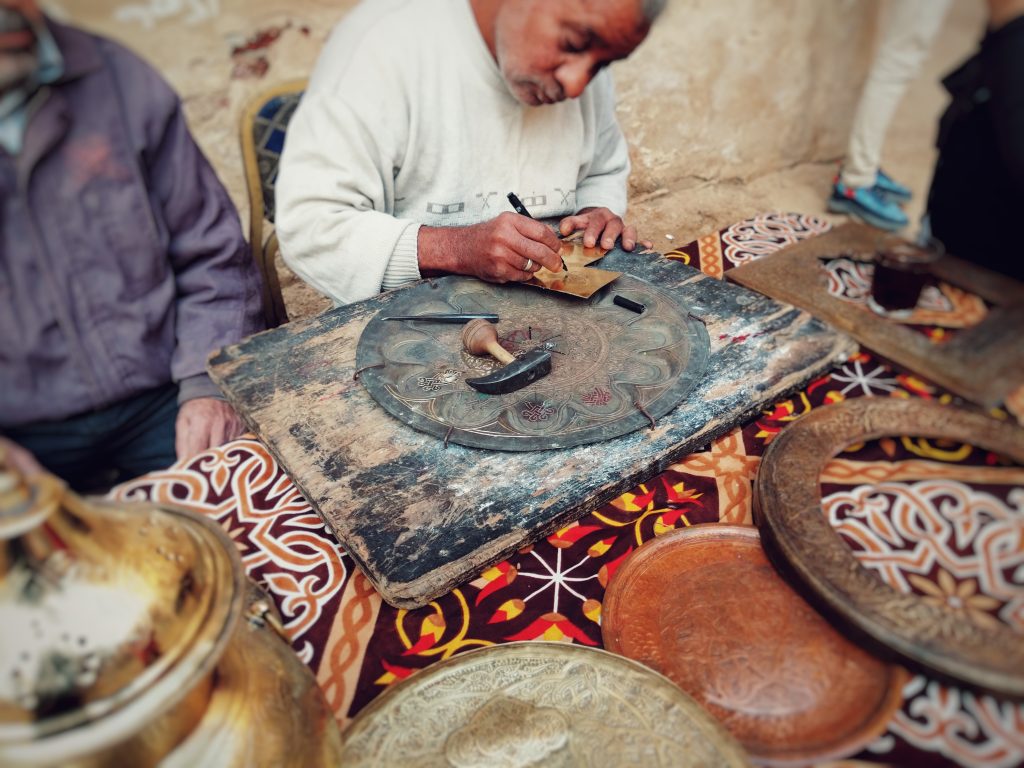
Why was it important to work with the community and not just preserve the area architecturally?
These buildings are not in the middle of the desert. They are not pyramids, they are not temples, they are in the middle of the living organism of the city, the City of the Dead. They are part of the urban fabric, so if you try to isolate them from the people who surround them, it is artificial in a way. But, conservation is a very tricky action because you have to know how to do it, you have be careful not to damage it, so our presence here secures that the building will be used in an appropriate way that doesn’t damage it.
We’ve built trust with the community and they don’t see the building as hollow walls, but they know it is beneficial to them and they can come. We have literacy classes for adults, English classes for children, all kinds of physical activities for children, art activities, self-development activities, life skills for women, and we create our programs in response to the community’s needs. We respond to what they tell us about themselves. It works and we earned their trust, and in that sense, the community got involved with us and with the monuments.
We’ve done a lot with the local children, from teaching English, science workshops, reading classes, theatre classes, and physical activities. A lot of organizations cooperate with us like Cairo Runners, who came and organize activities with the children, and a sporting club from Maadi who came to do activities and took them to the club.
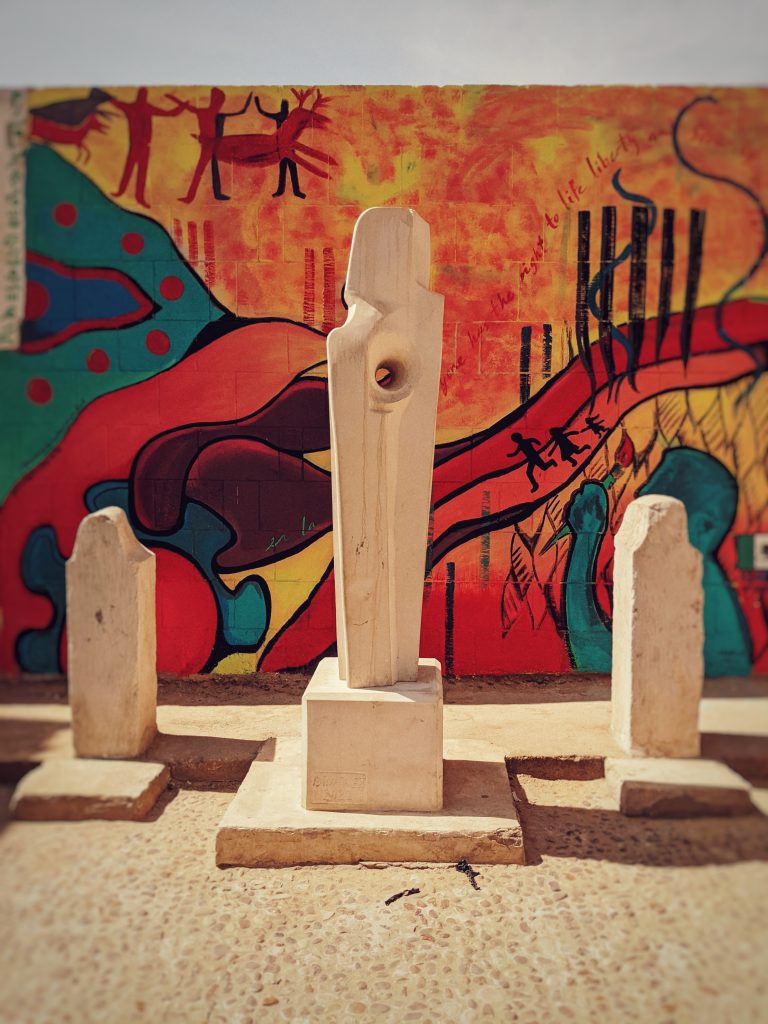
We also had a joint venture with the Magrabi Foundation, who came and checked people’s eyesight and prescribed them glasses. We do everything really. We look at what they need and try to help them; for instance, the reading and Arabic classes help them because the schools here require a lot of additional tuition. If they can get it here, it’s cheaper for the families and better for them. English is also very popular because they want to learn, they really want to learn.
We also work a lot with local women and we mostly do life skills, so we have instructors that help them and advise them on their everyday problems and we have a women-only enterprise called Mishka that has been making accessories and leather goods since 2017. There are about a hundred women who work with Mishka and they earn money. We taught them how to do it, but they produce everything in the workshop and sell it in the gallery and in the shop. They love it because they can work close to home; they earn money to help with the household, and they get a lot of satisfaction from it. Originally the idea was to work from home, but they really loved working together and it’s become almost like a social club.
WE SAID THIS: Don’t Miss… Preserving Heritage And Building Communities At Historic Cairo’s Bayt Yakan
